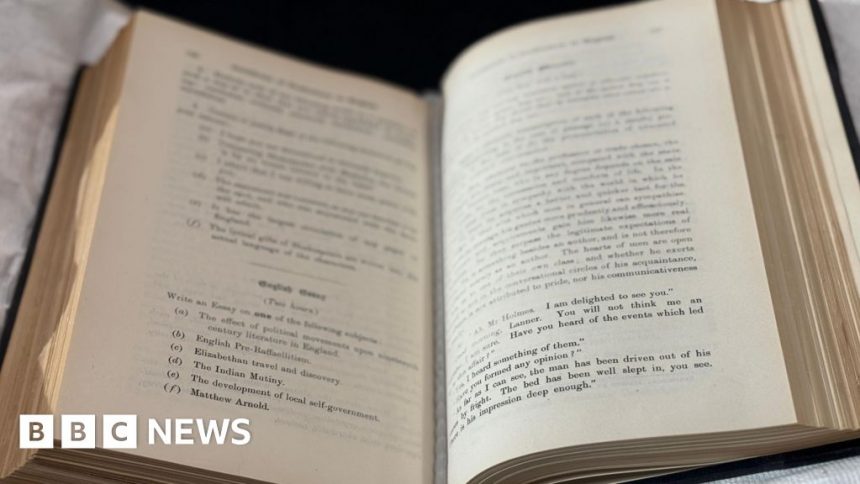Could you pass an English exam from 1913?
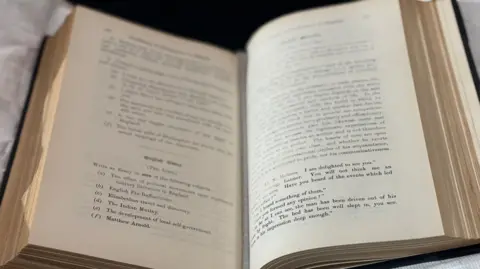 BBC
BBCDo you remember the feeling of sitting an exam? The halls crammed with desks and the sound of the ticking clock. Cambridge University Press and Assessment (CUP&A), one of the UK’s biggest exam providers, has been setting papers since the 1850s and its English exams have now been taken by more than 100 million people around the world. But today’s exam is very different to that very first paper.
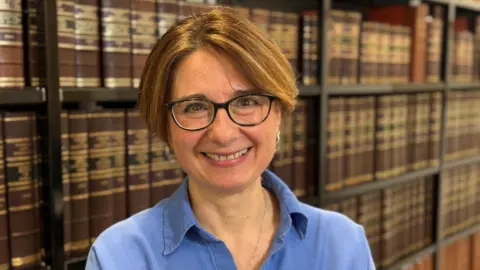
In 1913, three people sat down to take the first Cambridge English exam. They were all teachers and all of them failed. But would you? This is one of the questions – you can find the answers at the end.
Correct or justify four of the following sentences, giving your reasons:
(a) I hope you are determined to seriously improve.
(b) Comparing Shakespeare with Aeschylus, the former is by no means inferior to the latter.
(c) I admit that I was willing to have made peace with you.
(d) The statement was incorrect, as any one familiar with the spot, and who was acquainted with the facts, will admit.
(e) It has the largest circulation of any paper in England.
(f) The lyrical gifts of Shakespeare are woven into the actual language of the characters.
The exam comprised a series of papers on phonetics, grammar, and translation, which took 12 hours to complete.
“At first, it was an exam for a small elite who wanted to study English as an academic subject, like Latin or Ancient Greek,” says Dr Evelina Galaczi, director of research at CUP&A.
“At the time, grammar and translation were considered the most important thing, but now the exam is much more about using English to communicate.
“The shift was gradual, but in the Second World War English became a global language and so speaking and pronunciation became much more important.
“That was a catalyst for change, and I firmly believe that learning English opens doors.”
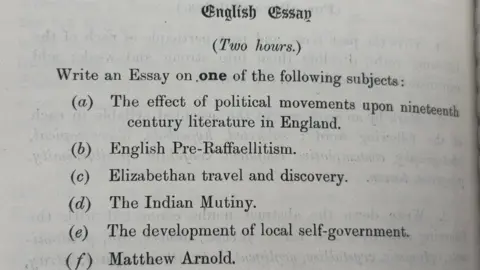
By the 1950s, there had been requests for the English exam to offer translation questions in dozens of different languages, ranging from Arabic to Vietnamese.
Gillian Cooke, group archivist at CUP&A, said: ” I think the take up for each language was quite small and so that probably wasn’t cost effective.
“It might be one of the reasons why the translation paper was dropped in the 1970s.”
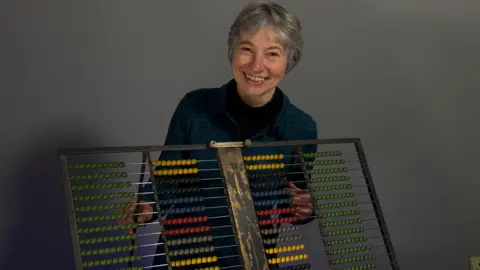
The Cambridge English exam has continued to evolve.
There are now different versions tailored to the needs of schools, higher education, and businesses.
“More than 100 million people across 130 countries have now sat our English exams,” says marketing director for higher education, Ian Cook.
“They’re recognised by more than 25,000 organisations from governments – which use them for immigration purposes – to employers and universities.
“Some universities in Germany, Sweden, and East Asia, for example, deliver IT and healthcare courses in English in order to attract the best candidates and so students need to show they have the language skills to cope with the course.”

Today, the exams are also available digitally and artificial intelligence (AI) is being used to create adaptive tests.
“In simple terms, the next question you’re served up depends on how well you answered the previous one,” says Mr Cook.
“And by offering a range of slightly more difficult and then easier questions as you go through, the technology will help to find your level.
“Our expertise and research have proven that the more teaching and tests are personalised, the better for students.
“We want people to have confidence, to pass – and show what they’re capable of.”
Despite the changes, CUP&A insists that its approach is as much about continuity as innovation.
Dr Galaczi adds: “Examiners and AI work together in marking and setting content for the exams, so we harness the strengths of both the human being and the machine.”
How did you do?
CUP&A says opinions about correct English grammar have changed, but in 1913, these would have been the expected answers:
(a) This is a split infinitive which would have been considered wrong. It should have said “to improve seriously”
(b) This is a hanging participle. It should have read “Shakespeare is by no means inferior to Aeschylus”. Now we would say “Shakespeare is just as good as”.
(c) Wrong tense. It should be “to make peace”.
(d) “Would admit” not “Will admit”.
(e) Correct
(f) Correct
Follow Cambridgeshire news on BBC Sounds, Facebook, Instagram and X.



